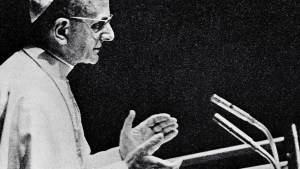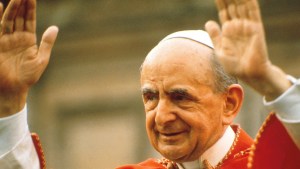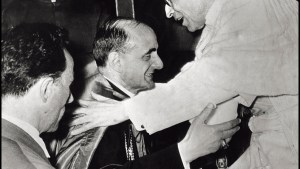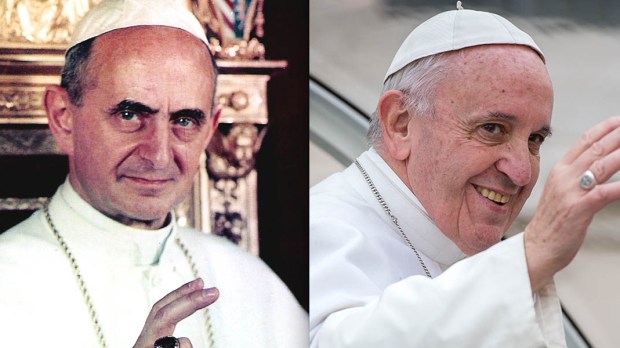L’Osservatore Romano recently made available an excerpt from the book Paul VI and The Roots of the Magisterium of Francis (“Paolo VI alle radici del magistero di Francesco”) published in Italian by the Libreria Editrice Vaticana in 2018. The author of the work, Jesuit Father Pierre De Charentenay, in a chapter titled “The Gospel and Joy,” asserts that there is a “special relationship” between these pontificates, revealed in key words such as evangelizing, preaching, hope, and discernment, among others.
Indeed, Pope Francis has mentioned on more than one occasion the positive influence that Paul VI’s papacy has had on his life as a priest. (Paul VI was pope from 1963 to 1978, when the future Pope Francis was in his mid-20s to early 40s.)
In fact, the pope who closed the Second Vatican Council will be canonized by Francis on October 14, in a ceremony in St. Peter’s Square as the Church Universal holds a Synod of Bishops dedicated to the vocation of young people today.
In the photo on the book’s cover, we see Bergoglio in the Vatican, silently praying before the tomb of Pope Montini, whose prayerful intercession Francis invokes for the Church.
No funeral face
“Consequently, an evangelizer must never look like someone who has just come back from a funeral!” Thus, author of the new book cites Francis’ statement in Evangelii gaudium, 10. He uses this attention-grabbing expression to try to enliven fervor and dynamism in the work of evangelization – a viewpoint expressed in similar language, the author says, by Montini and Bergoglio, both of whom expressed that evangelization is not so much the result of techniques, but of putting preaching at the heart of the mission of evangelization.
Bearing witness
It is not a coincidence that he quoted Pope Paul VI’s Evangelii nuntiandi when in Evangelii gaudium Francis stated: “Today too, people prefer to listen to witnesses: they ‘thirst for authenticity’ and ‘call for evangelizers to speak of a God whom they themselves know and are familiar with, as if they were seeing him’” [Apostolic Exhortation Evangelii nuntiandi (December 8, 1975)]. “It is therefore primarily by her conduct and by her life that the Church will evangelize the world, in other words, by her living witness of fidelity to the Lord Jesus – the witness of poverty and detachment, of freedom in the face of the powers of this world, in short, the witness of sanctity.” (Evangelii nuntiandi 41).
Clear language
The author of the new book shares how Paul VI examined various ways and means available for evangelization (Evangelii nuntiandi, 40) and that Montini stressed that the language of evangelization must be “simple, clear, direct, well-adapted” – and Pope Paul VI added, “profoundly dependent on Gospel teaching and faithful to the magisterium” (Evangelii nuntiandi, 43) because, the pope asserted, “the faithful assembled as a Paschal Church, celebrating the feast of the Lord present in their midst, expect much from this preaching, and will greatly benefit from it,” especially if it is also “animated by a balanced apostolic ardor coming from its own characteristic nature, full of hope, fostering belief, and productive of peace and unity.”
Another coincidence? The book points out that Francis too insists on the need for pedagogy, preparation in preaching, and also a spiritual attitude and clear language.

Read more:
What did Paul VI mean by saying “the smoke of Satan has entered the Church”?
Love as a commandment
Both popes show they are motivated to put into practice Jesus’ command, “Love one another,” but the author highlights what he calls an added social dimension which he sees as an “indispensable element for both popes” in the Church’s mission.
More than 40 years have passed since Pope Paul VI wrote his Exhortation and the author acknowledges that times have changed between Paul VI and Francis’ 21st century.
“This hypothetical objection,” however, provides a bridge between the two pontificates: their shared call for “the proclamation of the Gospel, the transmission of the faith, human promotion, the rejection of exclusion and violence, and the testimony of life.”

Read more:
Pope Paul VI had made provisions for resigning under certain conditions
Consumerism, atheism, and power
The author finds there are additional elements of affinity between both popes, including their respective criticisms of the consumer society, “the extreme results of modern progress.” Paul VI would seem to describe today’s world by pointing out “the increase of disbelief” and the denunciation of the “drama of atheistic humanism” (Evangelii nuntiandi, 77.) Likewise, the most characteristic mark of the modern world is “secularism,” excluding God from the world in order to “recognize the power of man.”
In this way, it is presented under “the most diverse forms, with a consumer society, the pursuit of pleasure set up as the supreme value, a desire for power and domination, and discrimination of every kind: the inhuman tendencies of this humanism” (Evangelii nuntiandi, 55.)

Read more:
Read what Paul VI says is the one mystery to understand the whole of Christianity
Success of the Church?
The author explains that Paul VI describes the changes, but the Church is not looking for the recipe for success, just as Jesus did not ask himself if he was successful, but wanted only to fulfill the Father’s will. Therefore, the Church focuses on deepening her vocation and her practice of the Gospel, he said. For example, he suggests, in a world that’s increasingly drifting toward fundamentalism, he insists on the “importance of dialogue,” equally proclaimed everywhere by both popes.
Dialogue and truth
Paul VI makes dialogue the key to ecclesial life in Ecclesiam suam, while Francis makes it a necessary path to reach the truth. He proposes it, in particular, in Evangelii gaudium as a means to build peace, through dialogue between faith and reason, ecumenical dialogue, interreligious dialogue, and social dialogue. “The line of dialogue, the basis of the Second Vatican Council, is fundamental for the Church. It is an approach to the human person, a way of approaching and surrendering to the other.”
Discernment
The author, also a Jesuit, explains that Pope Francis practices “discernment” as a way of knowing the will of God according to one’s understanding of the movements of the Holy Spirit within oneself. “The same attitude,” he adds, “of listening and discernment is proper to Paul VI. He retakes the reading of the signs of the times as an indispensable element for an ‘actualization’ (Ecclesiam suam, 52) and a renewal of the action of the Church.”

Read more:
Here are St. Ignatius’ 8 rules for the discernment of spirits
Charity and poverty
Like Paul VI (Ecclesiam suam, 54, 55 and 56), Francis urges conversion and the spirit of poverty and charity. Paul VI makes it one of the keys to renewal in the Church with an emphasis on poverty and charity. The Christian must abandon the logic of the “world.”
Joy
Finally, the author indicates that the goal of this long journey for Paul VI and for Francis is joy – “the joy of the Gospel.” The Argentine pope specifies some elements of this Christian joy: it is linked to biblical simplicity and evangelical poverty. Its depth is closely connected to the spirit of detachment of the believer and his or her ability to preserve a generous and simple heart.
We see this, he says, in the example of the contagious actions of “the Magi, the apostles, the women who discover the resurrection and run to announce the good news.”
Finally, joy is the source of energy for the Christian since “it is joy that indicates the way forward, contrary to the dark and sad signs that come from the evil spirit.”

Read more:
Bishop Barron: Pope Paul VI, Prophet

